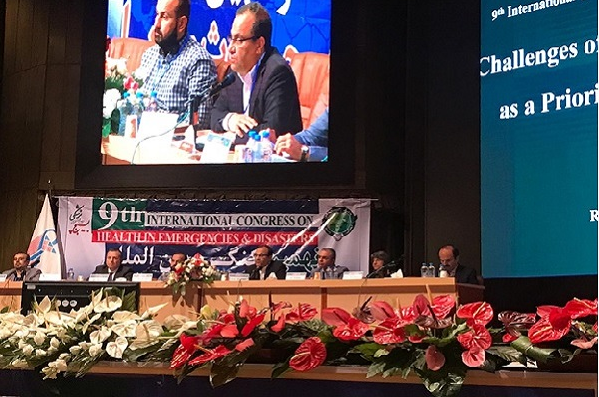
ECO participates in 9th International Congress on Health in Emergencies and Disasters
The 9th International Congress on Health in Emergencies and Disasters was held on 15-16 June 2019 in Tehran. The Congress was organized by Ministry of Health, Treatment and Medical Education of the Islamic Republic of Iran, and among the participants were the academia, national and international researchers, stakeholders from public and private sectors as well as representatives from UN and other international agencies in Tehran.
The Congress was inaugurated by H.E. Dr. Saeed Namaki, Minister of Health, Treatment & Medical Education of the Islamic Republic of Iran, and then various topics were raised by participants in separate panels and meetings within 2 days in this International Congress.
At the panel under the theme of "Challenges of Disaster Risk Governance of the Sendai Framework" which was organized for International Agencies, ECO Director for Human Resources and Sustainable Development, Mr. Kaan Sayin, briefed the congress about ECO tasks, programs and progress on Disaster Risk Reduction (DRR) which is aligned with the Sendai framework on DRR. Mr. Sayin has also emphasized on the strong evidence that reveals disasters make poverty worse in the ECO region and told that, it is more likely that the victims of these disasters will suffer more disasters in the future, unless proper measures are taken. Upon mentioning some regional challenges of DRR governance, he then concluded that the ECO Secretariat is committed to enhancing the implementation of the Sendai Framework on DRR to support the lives, livelihoods and critical infrastructures of the region against disasters.
Dr. Asadi Lari, Deputy Minister on International Affairs at the Ministry of Health, briefed the audience about UN activities and achievements regarding humanitarian support to around 5 million Iranian people affected by the recent floods (March- April 2019 in 26 provinces of Iran).
The 2 days of 9th International Congress on Health in Emergencies and Disasters, concentrated on infrastructure, strategies, regulatory and legal requirements for disaster risk governance, the role of coordination, cooperation and coherence in the establishment of disaster risk governance, community based disaster risk governance and clarifying the role of community based and religious - social organizations, resiliency and the role of health - social components in sustainable development, challenges ahead pertaining to health, emergency situations and various aspects of disasters.
At the sideline of this congress, a couple of side events, such as poster presentation, workshops, health and disaster exhibitions and site visits were offered to participants of the congress.
